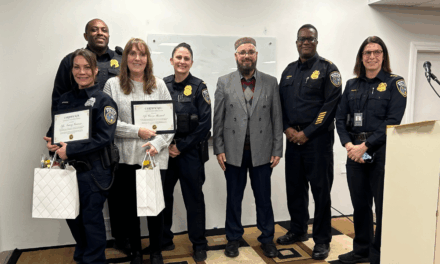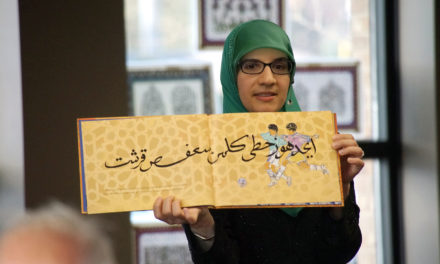MMWC Covid Education Team Members – Basma Daham, Hannah Zahngenner, Tasneem Jassar and other volunteers.
Photo
Mouna Photography & MMWC Covid Education Team Members for the Wisconsin Muslim Journal
As pandemic restrictions eased and many of us began enjoying the summer, deaths from coronavirus passed the 600,000 mark in the United States this week. In Wisconsin, deaths have reached about 8,000.
Medical experts say many of these deaths are avoidable but they are still happening, nearly all of them to the unvaccinated. A team of young people, organized through the Milwaukee Muslim Women’s Coalition, has joined a statewide fight to address the problem.
“You can stop the spread” campaign
The Wisconsin Department of Health Services has declared June “COVID-19 Vaccine Month of Action” and launched Phase II of its “You can stop the spread” campaign, a statewide media campaign to promote vaccination to the more than 50% of Wisconsinites currently not vaccinated.
In 2020, Phase I promoted best health practices for staying safe during the pandemic. In Phase II, the focus has shifted to vaccination, with the goal of having 80% of people vaccinated statewide.
Early June through mid-July features a fully rolled out media campaign and a big push that includes community outreach. Ads on social media and in traditional media aim to drive viewers to the latest information on the Wisconsin DHS site, the Center for Disease Control’s vaccine site and the 2-1-1 COVID-19 information hotline.
In addition to a state-wide media campaign, Wisconsin DHS offered grants to community organizations to promote a grassroots outreach that organizers call “critical” to the campaign’s success. The Milwaukee Muslim Women’s Coalition secured a grant that it has used to hire a dozen young people, all bilingual, from the Muslim community to work in the Muslim community.
MMWC Covid Team partnered with Muslim Community Health Center (MCHC) & Hayat Pharmacy at Masjid Al Quran and Masjid Mubarak
“The media campaign alone can’t achieve [the goal],” said Aly Marsh, the WHS COVID-19 Communications Coordinator, in a May 26 training video for the community teams. “We know the closer you are to an individual, the more influence you are going to have. This is the importance of the grassroots approach.”
As of June 16, Wisconsin has administered more than 5.4 million doses of COVID-19 vaccine.
- 49.3% of all Wisconsin residents have received at least one dose.
- 44.8% of all Wisconsin residents have completed the vaccine series.
- 25.1% of 12-15-year-old Wisconsin residents have received at least one dose.
A bilingual Muslim team shares information with the community
The MMWC’s COVID-19 Vaccine Information Team began its work May 13 at the Eid Festival at the Islamic Society of Milwaukee. Since then the team has attended events, like the Columbia-Palestine Solidary Event, June 6, at Mitchell Park in Milwaukee, and set up tables in front of ethnic grocers and other shops, where they provided information. It has also collaborated with Muslim-owned clinics and pharmacies who offered vaccinations on site.
The campaign’s strategy is to target people who are hesitant to take the vaccine, Marsh said in the training video.
“We are not looking to target folks who are truly, truly resistant to taking the vaccine. We know we won’t be able to change their minds, she explained.

MMWC Covid Education Team Members – Samawia Akhter & Sarah Farham
“The ones we are hoping to reach are those who have questions and concerns about the vaccine. The key here is there is an openness to changing their mind as more time goes by, as they learn more and most importantly, hear from trusted sources.
“The key strategy is to lead with empathy,” she continued. “To learn as much as possible about the concerns and questions they have and to provide them with the information they need from trusted sources so people can make informed decisions.”
She encouraged the community teams to share unbiased, scientific data and fact. “The message is, ‘You’ve got questions; we’ve got answers.’ Share the benefits of the vaccine, who it protects and how.”
The barriers the teams will face will be people’s mistrust of the government, uncertainty of effectiveness of vaccine, fear of side effects and concerns that the vaccine was too rushed, she said.
“At the end of the day, I don’t believe ads are going to change people’s minds who are truly hesitant. People change people’s minds. People motivate people. That’s why the work you all are doing is just so critical.”
Team members learn valuable skills while information
Basma Daham, 18, of Franklin, graduated from the University School of Milwaukee this year. She will be going to Washington University in St. Louis on the pre-med track, majoring in biology. She is a frequent volunteer with the MMWC, she said.
Her aunt forwarded information from the MMWC newsletter about the opportunity to join this outreach effort, she said. They were asking for college students who were bilingual; Daham speaks English and Arabic.”
“Personally, I have seen a lot of vaccine hesitancy in the Muslim community, especially among older people,” Daham said. “My mom is a critical care pulmonary physician. She told me a lot of sad stories. The height of COVID was hard for our family.

Some people believe misinformation. We make sure everyone is aware that vaccination is a necessary step in the return to normalcy.
At the Colombia-Palestine Solidarity event, Daham met a woman who said she was waiting to see if any of her family members who had been vaccinated had any negative effects. “We told her we had received the vaccine ourselves and it made us feel much safer, especially in crowds like at this event,” Daham said.
“We also told her it was easy to take, which was another of her concerns and she could find it at Muslim-owned pharmacies and clinics, to feel extra comfortable. That no appointment was needed. She seemed very receptive and said she would be going to get it later.
“I’ve learned that even though sometimes it seems like there is no way to convince them, by just taking a step back and really listening to their concerns, and putting yourself in their shoes, you can have more effective conversations and can really make a difference.”
Sarah Farhan, 24, of Milwaukee heard about the summer job opportunity from a friend of her sister who works for the MMWC. Farhan is bilingual in Arabic and English with a master’s degree in biology from the University of Wisconsin – Milwaukee and is headed to the Medical College of Wisconsin to continue her studies this fall. She said the job presented the perfect opportunity to serve the community and gain valuable skills.
“It is working great so far,” she said. “Most of us were raised in the community and know the people and the organizations. We attend the events. It hasn’t been difficult. We can take advantage of being well-acquainted with the community.”

MMWC Covid Education Team Members – Basma Daham, Samer Bilal and Hannah Zahngenner
Team members can suggest events and locations, make contacts and do their own scheduling, she said. They have bi-weekly trainings from the Wisconsin DHS that keeps them updated on health information and offers communication strategies.
When on site, they hand out informational fliers and tote bags and take a basic survey of the people they speak with. That survey provides evidence and information to DHS of the contacts they make. Team members also document short summaries of their experiences (when, where and what they did).
“We hand out fliers that have locations of Hayat Pharmacies and the Muslim Community and Health Center of Wisconsin (MCHC) and eye catching messages like ‘Free, safe and it works!’ We let people know that they can walk into clinics and pharmacies and ask questions of health professionals. All some people need is a little push.
“It feels like we really did something, especially if we speak with them in their language. Start off with everyone in English, then we can switch, ‘Do you speak Arabic?’ They become way more opened,” Farhan said.
Rawan Hamadeh, 19, of Brookfield is a sophomore at UW-Madison, majoring in neurobiology.
“My dad knew I’m interested in the health field, saw this on Facebook, and shared it with me. It is at the intersection of my interests of health and community safety.
“After the last year everyone went through, I want to do what I can to help us get back to normal. During COVID, I saw people get really sick and I knew I wanted to help prevent that. And in the process, I learn more about the vaccine and the science behind it.”
She also learned from communicating with hesitant people, she said. “I think at the beginning when the vaccine was rolling out, I was personally very judgmental of those who were not taking it. After talking with people about their concerns, people with lung issues or who had heard misinformation, I see it is a matter of them seeing the correct information. I am more aware of their concerns.
Last week, Hamadeh was with the team at Masjed Al Quran in Brown Deer. They partnered with a group from MCHC. Six of the people they spoke with were vaccinated on the spot, she said. “That was the most important day for me, to see people get the vaccine,” she said.
Hafsa Mohamed, 20, Milwaukee learned about the program from a friend who works at MMWC, where she had volunteered before. Mohamed, bilingual in Somali and English, is studying in an 18-month certificate program in ultrasound technology. She also has another job and is working on this project on weekends.
She says it seems to her “our community is doing well in getting vaccinated. Many have already taken it or have appointments.”
The experience has taught her “to be patient with people,” she said. “Most have been engaged and interested.”















